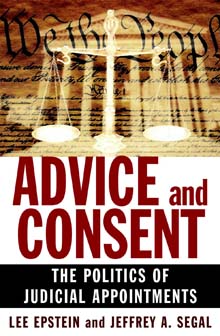Ph.D., the Mallinckrodt Distinguished University Professor of Political Science in Arts & Sciences and Professor of Law
(Oxford University Press, 2005)
Advice and Consent: The Politics of Judicial Appointments, a new book co-authored by Washington University’s Lee Epstein, hits the bookstores this month just in time to shed light on the vetting of President Bush’s nominees for two seats on the U.S. Supreme Court.
While some have warned that the president may use this opportunity to pack the High Court with conservative-leaning justices, Epstein’s book offers evidence that a president’s ability to perpetuate personal political legacies through court appointments tends to be both short-lived and unpredictable.
“During the first four years of justices’ tenure, their voting behavior correlates at a rather high level with their appointing president’s ideology, but for justices with 10 or more years of service, that relationship drops precipitously,” suggests Epstein, Ph.D., the Edward Mallinckrodt Distinguished University Professor of Political Science in Arts & Sciences and Professor of Law.

“In other words, liberal presidents appoint liberal justices who continue to take liberal positions for a while. Ditto for conservatives. But as new issues come to the Court, or as the justice for whatever reason makes adjustments in his or her political outlook, the president’s influence wanes.”
Epstein’s book is co-authored by Jeffrey Segal, the SUNY Distinguished Professor and Chair of Political Science at Stony Brook University.
Epstein and Segal trace the politics of the judicial nomination process through more than 200 years of American history, providing an anecdote-rich analysis of issues behind the institution’s origin and evolution.
The book offers a concise primer on all aspects of the judicial nomination process, exploring how the nomination process is influenced by special interest groups, the news media and the American Bar Association, and how presidents and the senate often have tried to remake the bench.
In a recent American Prospect magazine book review, writer Sam Rosenfeld describes Advice and Consent as a timely new book written “in pristine, jargon-free language.” He credits the book with clearly demonstrating that modern era of politicized nomination battles is nothing new
“Epstein and Segal use historical illustrations and the latest quantitative methods to inject some much-needed context and evidence into the current debate about judicial appointments,” Rosenfeld writes. “The book covers Supreme Court nominations and those for the lower federal courts, systematically analyzing the effect of political considerations on the timing of vacancies, the selection of nominees, the confirmation process in the Senate, and the long-term ideological balance of the courts.”
Epstein and Segal offer numerous anecdotes supporting their contention that president’s “can’t always get what they want” in their attempts to appoint seemingly like-minded judges and justices. But they also provide readers with sophisticated statistical analyses showing that these mistakes are few and far in between.
“This is a superb and even indispensable resource,” suggests Cass R. Sunstein, a Supreme Court scholar at the University of Chicago Law School. “Careful, precise, objective, and nugget-filled, it’s a wonderful guide to past, present, and future debates. If you want to know about judicial appointments, this is the best place to start.”
— Gerry Everding